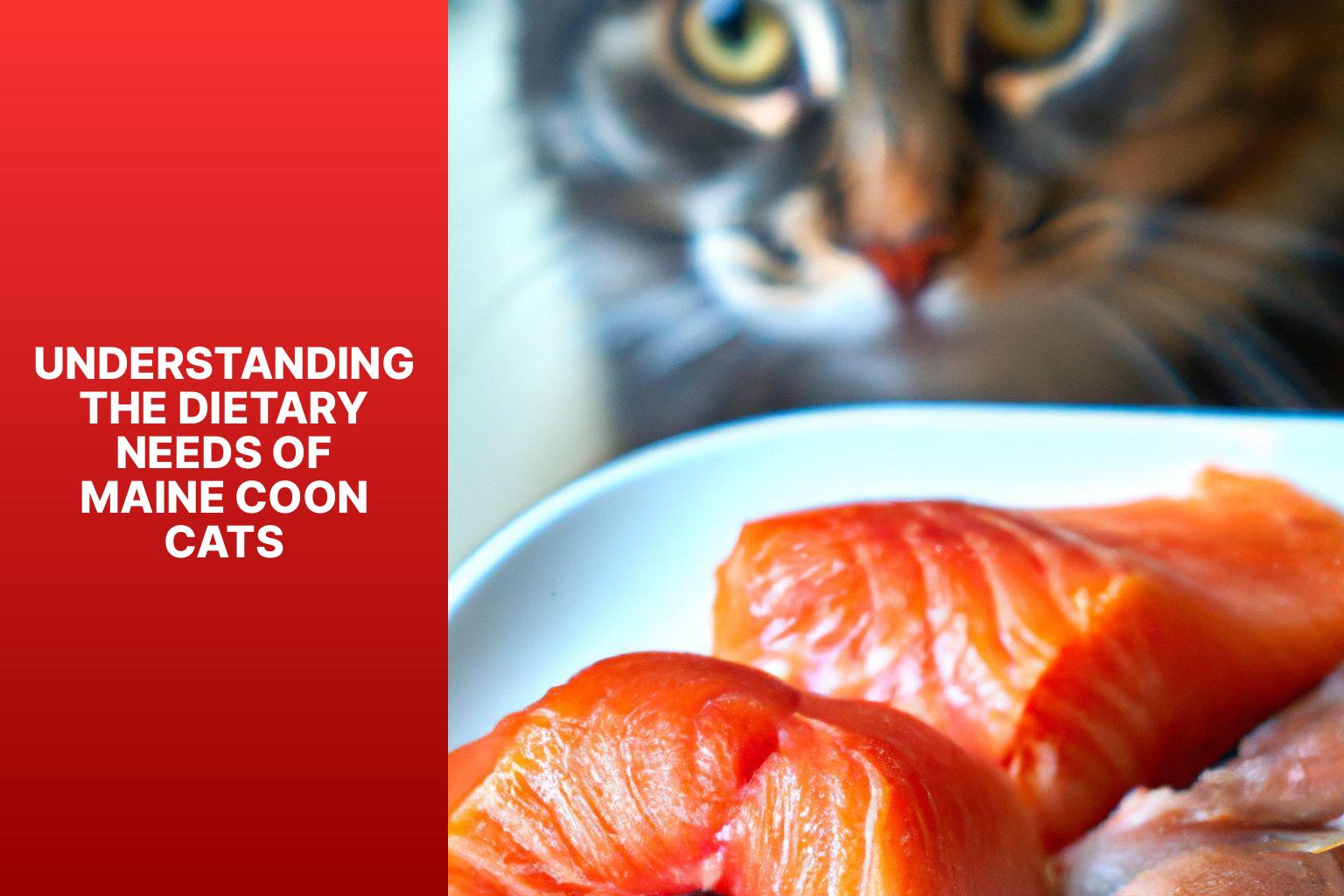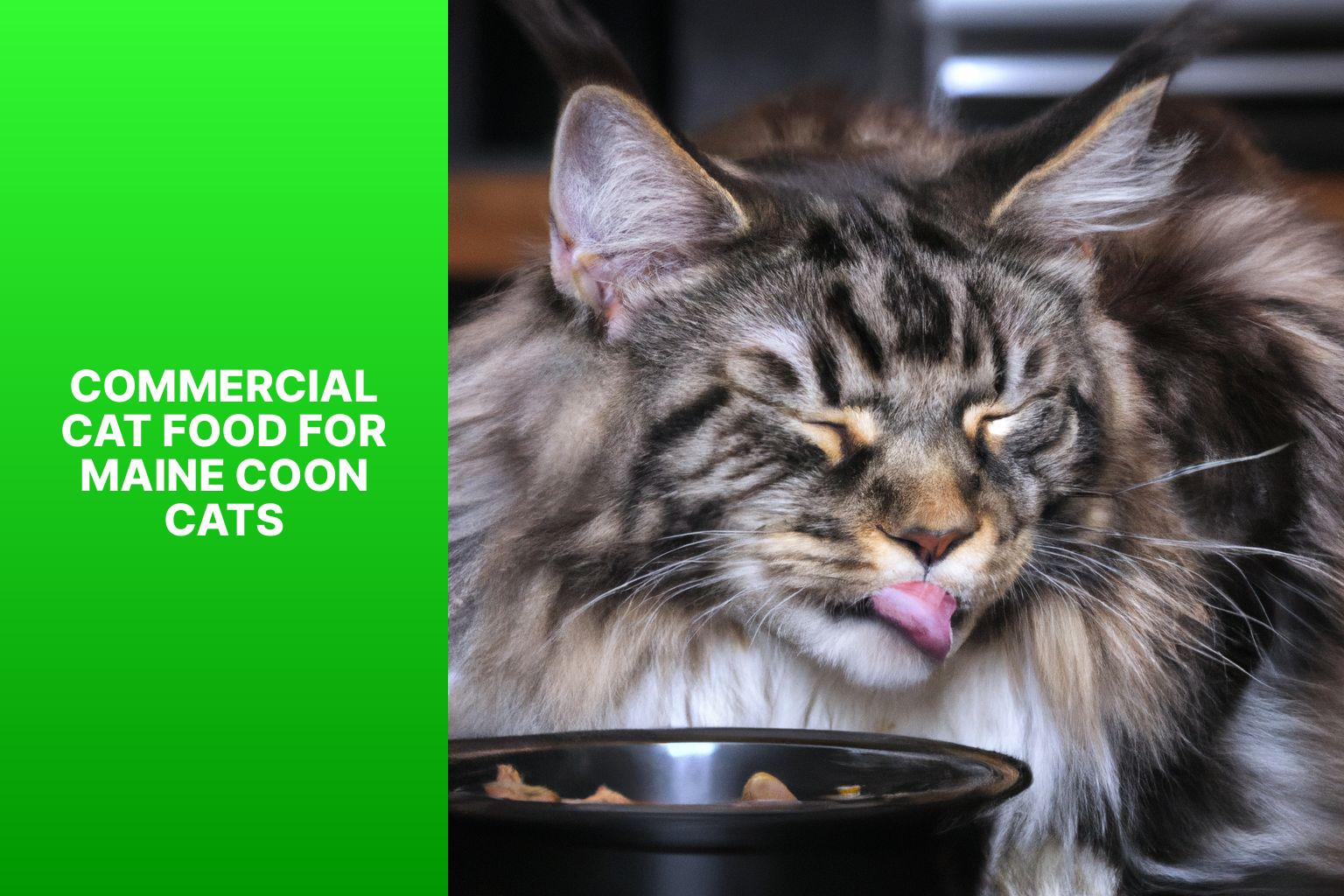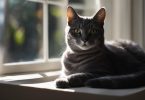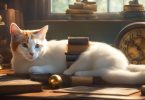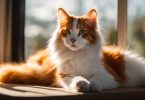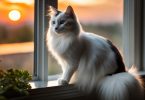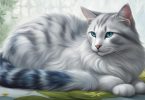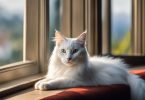Maine Coon cats are known for their large size and unique characteristics. To ensure their overall health and well-being, it is crucial to understand their dietary needs. Proper nutrition plays a vital role in their growth, development, and overall longevity. This article will guide you through the dietary requirements of Maine Coon cats and provide valuable information on what they should eat, whether it’s commercial cat food or a homemade diet. We will also explore feeding tips to help you establish a healthy and balanced diet for your beloved Maine Coon cat.
Key takeaway:
- Maine Coon Cats have specific dietary needs: Understanding the dietary requirements of Maine Coon Cats is crucial for their overall health and well-being.
- A balanced diet is essential: Maine Coon Cats require high-quality protein, healthy fats, essential vitamins and minerals, and adequate fiber to ensure optimal nutrition.
- Choosing the right food is important: Whether opting for commercial cat food or a homemade diet, selecting the appropriate options and following feeding guidelines is necessary for the proper care and nutrition of Maine Coon Cats.
Understanding the Dietary Needs of Maine Coon Cats
Photo Credits: Www.Catcornerblog.Com by Richard Adams
Understanding the dietary needs of Maine Coon cats is crucial for their overall health and well-being. To meet their nutritional requirements, you should focus on the following key aspects:
– Protein: Maine Coon cats should have a diet rich in high-quality animal-based protein sources such as chicken, turkey, and fish. This supports their muscular build and overall strength.
– Fat: It is important to include adequate amounts of healthy fats in their diet. These fats provide energy and help maintain their skin and coat in good condition. Incorporate sources of omega-3 and omega-6 fatty acids, such as salmon or fish oil.
– Fiber: Maine Coons benefit from a moderate amount of dietary fiber, which aids in digestion and helps prevent hairballs. Consider incorporating fiber-rich ingredients like pumpkin or psyllium husk into their diet.
– Water: Always ensure that your Maine Coon has access to fresh and clean water throughout the day. Proper hydration is crucial for their urinary tract health, as cats can be prone to issues in this area.
– Vitamins and Minerals: Maine Coon cats require a well-balanced mix of vitamins and minerals to support their overall health. You can look for cat foods that are specifically formulated for their breed, or consult a veterinarian for proper supplementation if necessary.
By understanding and providing a balanced and nutritionally complete diet for Maine Coon cats, you play a vital role in ensuring their optimal health and well-being.
What are the General Nutritional Requirements for Maine Coon Cats?
The general nutritional requirements for Maine Coon cats can be summarized as follows:
- High-Quality Protein: Maine Coon cats require a diet high in protein from animal sources. Protein supports their muscle development and overall growth.
- Healthy Fats: Omega-3 fatty acids and other healthy fats are important for maintaining the Maine Coon cat’s skin and coat health. They also provide energy and support bodily functions.
- Essential Vitamins and Minerals: Maine Coon cats need a balanced mix of vitamins and minerals to support their immune system, promote healthy bone development, and ensure proper organ function.
- Adequate Fiber: Fiber aids digestion and helps prevent gastrointestinal issues. Maine Coon cats should have a diet that includes an appropriate amount of fiber for a healthy digestive system.
Maine Coon cats have specific dietary needs to support their growth, energy levels, and overall well-being. A diet rich in high-quality protein, healthy fats, essential vitamins and minerals, and adequate fiber will help maintain their health and vitality. Consult with a veterinarian to determine the precise nutritional requirements for your Maine Coon cat based on factors such as age, weight, and activity levels. Remember to always provide fresh water to keep your cat properly hydrated.
Fun Fact: Maine Coon cats are known for their large size and muscular build, and their nutritional requirements reflect their active and robust nature.
How Much Food Should Maine Coon Cats Eat?
When determining how much food Maine Coon cats should eat, it is important to consider their dietary needs and provide the appropriate amount for maintaining a healthy weight. Several factors come into play when deciding the quantity of food for Maine Coon cats, including their age, weight, activity level, and the type of food they consume.
Maine Coon kittens, due to their growth and development, typically require more food compared to adult cats. It is advisable to consult a veterinarian for guidance on the appropriate amounts of food for different stages of their lives.
The weight of the cat is a crucial factor in determining the proper food intake. Overweight cats may require portion control to manage their weight, while underweight cats might need larger portions to address their nutritional needs.
The activity level of the cat also influences their food requirements. Active Maine Coon cats, who expend more energy, may need larger portions to fuel their activities. On the other hand, sedentary cats may require fewer calories.
The type of cat food being provided plays a role in their caloric intake. Different brands have varying caloric densities, and high-quality brands often offer feeding guidelines based on the cat’s weight and activity level.
To ensure that your Maine Coon cat maintains a healthy weight, it is recommended to monitor their weight regularly and adjust food portions accordingly. For a personalized feeding plan tailored to your cat’s specific needs, it is best to consult with a veterinarian.
What Should Maine Coon Cats Eat?
When it comes to the dietary needs of our beloved Maine Coon cats, there are essential components that we need to focus on. In this section, we will dive into what Maine Coon cats should eat to ensure their optimal health and well-being. From high-quality protein sources and healthy fats to essential vitamins and minerals, we’ll explore the key elements that make up a balanced diet for these majestic felines. Plus, we can’t forget the importance of adequate fiber to support their digestive system. Let’s dig in and nourish our Maine Coon companions!
1. High-Quality Protein
When it comes to Maine Coon cats’ dietary needs, high-quality protein is crucial for their health. The importance of high-quality protein lies in its role in muscle development and maintenance. It supplies the necessary amino acids for growth and repair. To meet their dietary requirements, Maine Coon cats should consume around 25-30% of their daily caloric intake as protein.
For protein sources, it is recommended to opt for chicken, turkey, fish, and beef. These animal-based proteins are not only easily digestible but also provide the essential amino acids needed for their well-being.
An excellent option for high-quality protein is commercial cat food. When selecting a brand, look for one that has meat or meat meal listed as the first ingredient and avoid those containing fillers or by-products.
If you prefer homemade diets, it is essential to consult with a veterinarian or veterinary nutritionist to ensure balanced and complete meals for your cat.
A true story that exemplifies the significance of high-quality protein is the case of Max, a rescued Maine Coon cat. Max’s poor muscle development and weak immune system showed remarkable improvement after switching to a diet rich in high-quality protein. Providing Maine Coon cats with the right amount and quality of protein is essential for their overall health and well-being.
2. Healthy Fats
Healthy fats play a vital role in ensuring the well-being of a Maine Coon cat. These fats are essential as they provide crucial nutrients, support brain function, reduce inflammation, and help maintain a healthy coat and skin. It is important to consider the following key points regarding healthy fats for Maine Coon cats:
1. Omega-3 fatty acids: Maine Coon cats require these fats, which can be obtained from fish oil, flaxseed oil, or chia seeds, to promote a healthy coat, skin, and optimal brain function.
2. Moderation in fat content: Due to their slow metabolism, Maine Coon cats need an appropriate amount of fat in their diet to ensure sufficient energy levels. It is important to avoid excessive fat intake in order to prevent weight gain.
3. Animal-based fats: Being obligate carnivores, Maine Coon cats should primarily consume animal protein sources such as chicken, turkey, or fish. Animal-based fats not only provide important nutrients but also contribute to their satisfaction with their diet.
4. Avoidance of unhealthy fats: Similar to humans, Maine Coon cats should stay away from excessive saturated or trans fats found in certain cat foods. Consumption of these unhealthy fats can lead to obesity, heart disease, and other health issues.
By incorporating healthy fats into your Maine Coon cat’s diet, you can support their overall health, maintain a shiny coat, and provide them with vital energy to thrive.
3. Essential Vitamins and Minerals
Essential vitamins and minerals are crucial for the health of Maine Coon cats. These vital nutrients play a significant role in keeping them healthy and happy.
One of the essential vitamins for Maine Coon cats is Vitamin A. This nutrient is important for maintaining good vision and a strong immune system. You can find Vitamin A in foods like liver, fish oil, and eggs.
In addition to Vitamin A, the B complex vitamins are also important for these cats. These include B1, B2, B3, B5, B6, B9, and B12. These B vitamins help with energy production, metabolism, and the proper functioning of the nervous system. Foods such as meat, fish, dairy products, and eggs are excellent sources of these essential vitamins.
Another essential vitamin for Maine Coon cats is Vitamin D. This nutrient is crucial for the absorption of calcium and phosphorus, which promote strong bones and healthy teeth. Sun exposure, fish liver oil, and fatty fish are all sources of Vitamin D.
Vitamin E is another vital nutrient for these cats. It acts as an antioxidant, protecting their cells from damage. Foods like oils, nuts, and seeds are natural sources of Vitamin E.
Calcium and phosphorus are also necessary minerals for bone growth and development in Maine Coon cats. Dairy products, fish, and bone meal are excellent sources of these minerals.
Iron is another important mineral that these cats need. It plays a crucial role in the production of red blood cells and the transport of oxygen. Foods like liver, poultry, and fish are rich sources of iron.
Zinc is a mineral that supports a healthy immune system and reproduction in Maine Coon cats. Meat, fish, and eggs are foods that contain zinc.
Taurine is an essential amino acid for cats and must be provided through their diet. It supports heart function, vision, and reproductive health. Taurine is found in animal-based proteins like meat and fish.
Lastly, omega-3 fatty acids are beneficial for reducing inflammation and supporting healthy skin and coat in Maine Coon cats. Fish oil, salmon, and sardines are excellent sources of omega-3 fatty acids.
Incorporating these essential vitamins and minerals into a Maine Coon cat’s diet is crucial for their overall well-being.
4. Adequate Fiber
Adequate fiber is crucial for Maine Coon cats’ digestive health. Consider these key points:
- Fiber aids digestion by promoting bowel movements and preventing constipation.
- It helps regulate blood sugar levels and manage weight by inducing a feeling of fullness.
- Maine Coon cats need about 2-4% fiber in their diet.
- Sources of fiber include:
- Pumpkin: Provides soluble and insoluble fiber that aids digestion.
- Oatmeal: Contains soluble fiber that regulates blood sugar levels.
- Barley: Contains soluble and insoluble fiber, promoting healthy digestion and preventing diarrhea.
- Flaxseed: Provides omega-3 fatty acids and fiber that promote healthy digestion.
- Pea fiber: Provides soluble and insoluble fiber that helps maintain a healthy digestive system.
Incorporating adequate fiber-rich foods into your Maine Coon cat’s diet can support their digestive health and overall well-being. Remember to consult a veterinarian before making significant changes to your cat’s diet.
Commercial Cat Food for Maine Coon Cats
Photo Credits: Www.Catcornerblog.Com by James Rodriguez
To meet the dietary needs of Maine Coon cats, there are several options of commercial cat food available, specially formulated for Maine Coon cats. These options provide necessary nutrients for their health and well-being. It is recommended to choose commercial cat food that is specifically formulated for Maine Coon cats to ensure a balanced diet.
When selecting commercial cat food for Maine Coon cats, it is important to consider the following factors. First, the protein content of the cat food is crucial as Maine Coon cats need a high protein diet for their active lifestyle. Look for cat food with a protein percentage of around 30% or more.
Additionally, Omega-3 fatty acids play a vital role in promoting healthy skin and a shiny coat. Therefore, it is advisable to choose cat foods that contain fish oil or other sources of Omega-3 fatty acids.
Opt for cat food that has real meat as the primary ingredient and avoid those with fillers and artificial additives. Nutrient-rich ingredients are essential for meeting the dietary needs of Maine Coon cats.
Maine Coon cats are prone to joint issues due to their size. To support their joint health, look for cat food that includes glucosamine and chondroitin, which provide joint support.
Considering that Maine Coon cats can have sensitive digestive systems, it is important to choose cat food that contains prebiotics or probiotics to promote a healthy gut and digestive health.
To determine the best commercial cat food and feeding quantities based on your Maine Coon cat’s specific needs, it is advisable to consult with your veterinarian. Providing them with a balanced diet will contribute to their overall well-being and long-term health.
What to Look for in Commercial Cat Food for Maine Coon Cats?
When deciding on the ideal commercial cat food for Maine Coon cats, it is crucial to take into account the following aspects in order to provide them with the necessary nutrition.
Maine Coon cats, due to their larger size and muscular build, require a substantial amount of high-quality protein. Therefore, it is recommended to opt for cat food containing animal protein sources such as chicken, turkey, or fish.
In addition, Maine Coon cats also need an adequate intake of healthy fats to maintain their overall health and promote the wellbeing of their skin and coat. To meet this requirement, it is advisable to select cat food that includes omega-3 and omega-6 fatty acids derived from fish oil or chicken fat.
Another key consideration is providing Maine Coon cats with essential vitamins and minerals for their overall wellbeing. It is particularly important to ensure they receive sufficient amounts of calcium, phosphorus, and taurine to support the health of their bones and heart.
Moreover, Maine Coon cats require an adequate amount of fiber in their diet to promote healthy digestion and regular bowel movements. Therefore, it is recommended to choose cat food with a moderate level of fiber.
By taking these factors into consideration and selecting cat food that fulfills these requirements, you can guarantee that your Maine Coon cat receives the essential nutrients they need for a well-balanced and healthy diet.
Recommended Brands of Commercial Cat Food for Maine Coon Cats
When it comes to choosing the best commercial cat food for Maine Coon cats, there are several recommended brands available:
- Royal Canin Maine Coon
- Hill’s Science Diet Adult Urinary & Hairball Control
- Purina Pro Plan Focus Adult Indoor Care
- Blue Buffalo Wilderness High Protein Dry Cat Food
- Nutro Max Indoor Adult Dry Cat Food
These brands meet the nutritional needs of Maine Coon cats with a balanced diet that includes high-quality protein, healthy fats, essential vitamins and minerals, and adequate fiber.
Royal Canin Maine Coon is a popular choice tailored to the breed’s unique needs. Hill’s Science Diet and Purina Pro Plan offer specialized formulas for urinary and hairball control. Blue Buffalo Wilderness and Nutro Max provide high protein options for active Maine Coons.
When choosing commercial cat food for Maine Coon cats, prioritize your pet’s health and well-being. These recommended brands have been trusted by cat owners and veterinarians for their quality ingredients and formulation.
Consult with your veterinarian to determine the best commercial cat food for your Maine Coon based on their specific dietary needs and any existing health conditions.
Homemade Diet for Maine Coon Cats
Discover the incredible benefits of a homemade diet for Maine Coon cats. From promoting optimal nutrition to tailoring meals to their specific dietary needs, we’ll explore why this approach is gaining popularity among cat owners. In addition, we’ll uncover important guidelines to consider when preparing their meals, ensuring a balanced and healthy diet. So, get ready to dive into the world of homemade diets for Maine Coon cats and provide your feline friend with the best culinary care they deserve!
Benefits and Considerations of a Homemade Diet for Maine Coon Cats
When it comes to the dietary needs of Maine Coon cats, there are several benefits and considerations to take into account for a homemade diet:
– Control over ingredients: A homemade diet for Maine Coon cats allows you to choose high-quality proteins, such as chicken or turkey, essential for muscle development and overall health.
– Avoiding fillers and additives: By preparing their food at home, you can ensure that your Maine Coon cat avoids fillers, artificial colors, or additives commonly found in commercial cat food. This helps minimize the risk of allergies or digestive issues.
– Tailored nutrition: Homemade diets can be customized to meet the individual nutritional requirements of Maine Coon cats. You can add specific vitamins and minerals to promote optimal health and well-being.
When considering a homemade diet for your Maine Coon cat, keep the following guidelines in mind:
– Consult with a veterinarian: Before starting a homemade diet, it’s essential to consult with a veterinarian to provide a balanced and complete diet that meets your cat’s specific needs.
– Proper portion sizes: Feed your Maine Coon cat the correct portion sizes to maintain a healthy weight. Follow the veterinarian’s recommendations and adjust portion sizes as needed.
– Diversify their diet: Offer a variety of proteins, vegetables, and grains to provide a well-rounded diet and make mealtime more enjoyable.
Important Guidelines for Preparing a Homemade Diet for Maine Coon Cats
The Important Guidelines for Preparing a Homemade Diet for Maine Coon Cats are as follows:
1. Provide a balanced diet: Ensuring that the homemade diet for Maine Coon cats has all the essential nutrients they need is crucial. This includes incorporating high-quality protein, healthy fats, vitamins, minerals, and fiber.
2. Include a variety of protein sources: To meet their dietary needs, it is important to incorporate different sources of protein such as chicken, turkey, fish, and beef. This will provide the necessary range of amino acids for their overall health.
3. Consider portion sizes: Maine Coon cats have a larger body size, so adjusting portion sizes accordingly is necessary. It is recommended to consult a veterinarian to determine the appropriate amount based on their weight and activity level.
4. Avoid harmful ingredients: It is crucial to strictly avoid toxic or harmful ingredients like onions, garlic, grapes, raisins, chocolate, or caffeine when preparing the homemade diet. These ingredients can cause serious health problems for cats.
5. Ensure proper food preparation: Following safe food handling practices is essential when preparing the homemade diet. This includes washing hands before and after handling food, using clean utensils and surfaces, and proper food storage to prevent bacterial growth.
Pro-tip: Regularly monitoring your Maine Coon cat’s weight and overall health when feeding them a homemade diet is important. If you notice any changes, consulting a veterinarian to make necessary adjustments to their diet is recommended.
Feeding Tips for Maine Coon Cats
Feeding your Maine Coon cat can be a rewarding experience, ensuring their health and wellness. In this section, we’ll uncover valuable tips to optimize your cat’s diet. From establishing a feeding schedule to monitoring body weight and adjusting food portions, we’ll explore ways to keep your Maine Coon in top shape. We’ll delve into the importance of hydration and share essential advice for ensuring your cat stays adequately hydrated. Let’s dive into the world of feline nutrition and set our Maine Coon friends up for a healthy life!
Establishing a Feeding Schedule
Establishing a feeding schedule is crucial for Maine Coon cats to ensure they receive the right amount of food at the right times. Follow these steps:
- Determine the number of meals per day based on your cat’s age and activity level. Adult Maine Coon cats should be fed 2-3 times a day.
- Allocate specific times for each meal and stick to a consistent schedule. Feeding them at the same times every day helps establish structure and security.
- Measure the appropriate portion size for each meal. The amount of food depends on your cat’s weight, age, and needs. Consult your veterinarian for specific recommendations.
- Divide the daily portion into equal servings. For example, if your cat needs to consume 1 cup of food per day, divide it into two 1/2 cup servings for two meals.
- Place the food in a clean, shallow bowl or use an interactive feeder to stimulate their hunting instincts and slow down their eating pace.
- Set a specific feeding location where your cat feels comfortable and undisturbed. This promotes a peaceful environment and reduces stress during meal times.
A true story that exemplifies the importance of establishing a feeding schedule is my own Maine Coon cat, Rocky. When I brought him home, he struggled with meal times. By creating a consistent feeding schedule, he became more relaxed and looked forward to his meals. He now knows exactly when it’s time to eat, which has improved his overall well-being and happiness.
Monitoring Body Weight and Adjusting Food Portions
Monitoring body weight and adjusting food portions are crucial for maintaining the health and well-being of Maine Coon cats. Weigh your Maine Coon cat regularly to track any changes in their body weight. This will help you monitor their overall health and ensure they maintain a healthy weight.
Consult with a veterinarian to determine the ideal weight range for your Maine Coon cat based on their age, breed, and overall health. The veterinarian can guide you on the appropriate food intake to maintain a healthy weight.
In addition to weighing your cat, observe their body condition. If you can easily feel their ribs without excessive fat, it indicates a healthy weight. Adjust their food portions accordingly if needed.
Maintain a balanced calorie intake for your Maine Coon cat. Adjust their food portions based on their activity level and lifestyle. More active cats or those with a higher metabolism may require more calories.
Measure your cat’s food portions accurately using a kitchen scale or measuring cup. This ensures they receive the appropriate amount of food and allows for adjustments if needed.
Ensuring Hydration
Maine Coon cats need to ensure hydration for their overall health and well-being. Here are some key ways to ensure your Maine Coon cat stays properly hydrated:
- Ensure fresh water daily: Make sure to provide your Maine Coon cat with clean and fresh water at all times. Cats may prefer running water, so using a cat water fountain can be considered.
- Monitor water intake: Keep track of how much water your Maine Coon cat drinks each day. On average, cats need about 60-80 ml of water per kilogram of body weight. Adjust the water amount accordingly to ensure your cat drinks enough.
- Incorporate wet food: Including wet or canned food in your Maine Coon cat’s diet can increase their water intake as it contains a higher water content compared to dry food. Adding moist foods can help maintain hydration levels.
- Use hydration supplements: To increase your cat’s water intake, you can consider using hydration supplements or adding a small amount of water to their food. This can be beneficial for cats that do not consume much water.
- Regularly clean water bowls: It is essential to clean your cat’s water bowl on a daily basis to eliminate any bacteria or contaminants that may affect their water consumption. A clean water bowl ensures your cat has access to clean and fresh water at all times.
By following these tips, you can ensure your Maine Coon cat stays properly hydrated, promoting their overall health and well-being.
Some Facts About What Do Maine Coon Cats Eat:
- ✅ Maine Coon cats require roughly 24 to 35 calories per day per pound of body weight. (Source: Maine Coon Central)
- ✅ The average Maine Coon cat will eat nine ounces of wet food or three ounces of dry food every day. (Source: Maine Coon Central)
- ✅ Overfeeding and lack of exercise can lead to Maine Coon cats being overweight. (Source: Maine Coon Central)
- ✅ Maine Coon cats should have biscuits available throughout the day with a high protein content and without cereal. (Source: Ruffians Maine Coons)
- ✅ Cats are carnivores and eat meat as a large part of their diet, but they may also enjoy exploring and sampling different tastes. (Source: Ruffians Maine Coons)
